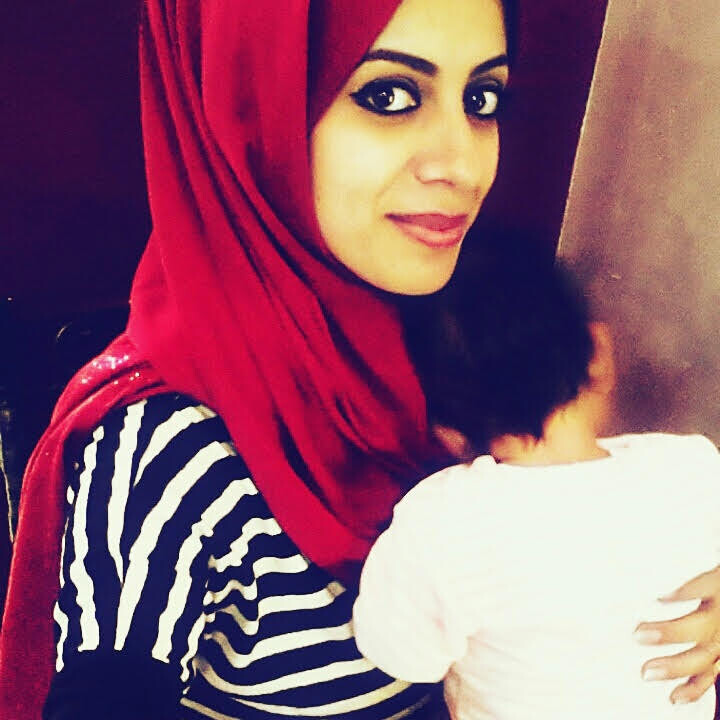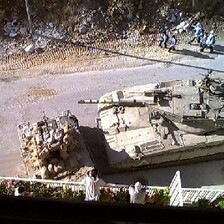The Electronic Intifada Gaza Strip 17 February 2017

The author with her daughter. (Image courtesy of Nesma Seyam)
The doctor studied the test results, raised her head and smiled.
“Pregnant,” she said. “Congratulations, you are pregnant!”
All I could muster in response was: “Why?”
Joy, excitement and fear knotted inside me. My husband and I would soon have a baby, filling our life with love and noise.
But a storm of questions raged in my head. I immediately began to fear that Israel would bomb us again.
How would we run away if that happened? How would we survive?
I was scared and nervous. The memories of all the wars I had lived through came alive and overpowered me.
Terror
Even though I am a media worker, I try to avoid watching the news when Israel is bombing us, to spare myself the sight of shredded bodies, of mothers weeping for their sons.
When Israel bombed Gaza in November 2012, the television showed a mother running right and left in a hospital after she saw the bodies of three of her children, looking for the fourth, asking everyone around her if they knew where the child was.
Is this what it means to be a mother in Gaza?
Two years later, during Israel’s 51-day onslaught in the summer of 2014, most of my family, including my sister and her four children, slept on the floor of the living room on the western side of our apartment.
The eastern side of the home is situated above an apartment which belonged to a man who was wanted by Israel. My bedroom was located on that side of the apartment.
I slept in it throughout the war, even though it was directly above a likely target. I was never afraid, because I believed that I would not hear or feel the missile that would end up killing me.
One night, the shelling and bombings intensified terribly, and my mother insisted that I sleep in the living room with everyone else. She rejected my efforts to convince her that the missile has no intellectual capacity to recognize that it is approaching our living room and change its path.
As we sat in silence, my sister Walaa started to frantically separate her children on opposite sides of our home.
Her entire body shaking with fear, she said, “I’ll put one girl and one boy on my right and the other boy and girl on my left. If they bomb one side of the apartment, then two of them will likely survive. I don’t want all of them to die at once.”
It took me a while to process what she had said. I forced a smile while tears gathered in my eyes. Slowly, I slid under my sheets, pretending to sleep, and cried all night.
My ears were alert throughout the night. Walaa didn’t sleep as her eldest daughter, Shahd, who was 6 years old at the time, kept waking up, frightened, and would run to the corridor. Walaa would bring her back, calm her down and put her back to sleep again.
Alive but not unharmed
We were not bombed in the end. But that does not mean we were unharmed.
Two years have now passed. I’ve since gotten married and gave birth to a beautiful and healthy baby girl with black hair and two deep dimples on her cheeks. She’s 6 months old now.
I am happy I am a mother and I love my daughter beyond words. But I am also afraid. I can’t bear the thought that because I am a Palestinian in Gaza, I may have to guess where in our home my baby is least likely to be killed.
Whenever I hear a loud sound, I run to my child and hug her. Every night I hear thunder, I bend over and cover her to try and protect her.
The havoc the last war wrought on my soul is immense, the sound of the bombing and shelling traumatize me to this day.
I carry my baby daughter with me everywhere, to meetings with officials and notables, not caring what they think of it, not caring when I hear her crying on the audio recordings when I am transcribing my interviews.
The only thing I care about is that she is with me, and whatever our fate, we will receive it together.
Nesma Seyam is an interpreter, journalist and fixer based in Gaza. Twitter: @Nesma_Seyam





